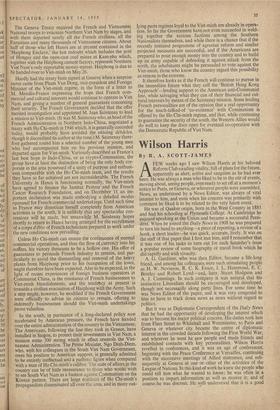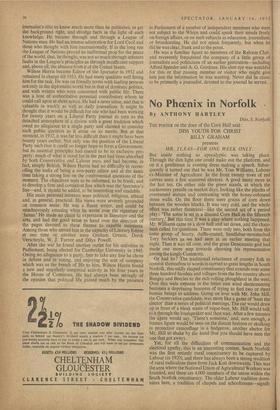Wilson Harris
By R, A. SCOTT-JAMES AFEW weeks ago I saw Wilson Harris at his beloved Reform Club exuding vitality, full of plans for the future, apparently as alert, active and sanguine as he had ever been. He was always a man who liked to be in the stir of events, moving about, seeing people, ever ready to set off at a moment's notice to Paris. or Geneva, or wherever people were assembled. News, as understood by a News Editor, was always of vital interest to him, and even when his concern was primarily with comment he liked it to be related to the very latest event.
He was of Quaker origin, born in the West Country in 1883 and had his schooling at Plymouth College. At Cambridge he enjoyed speaking at the Union and became a successful Presi- dent. When he joined the Daily News in 1908 he was prepared to turn his hand to anything—a piece of reporting, a review of a book, a short leader—he was quick, accurate, lively. It was on the staff of that paper that I first met him, and I remember that it was one of his tasks to turn out for each Saturday's issue a popular review of some biography or travel book which he did rapidly and with vivacity. A. G. Gardiner, who was then Editor, became a life-long friend, and among his colleagues were such stimulating people as H. W. Nevinson, R. C. K. Ensor. J. L. Hammond, E. C. Bentley and Robert Lynd—and, later, Stuart Hodgson and A. J. Cummings. In such company it was natural that his instinctive Liberalism should be encouraged and developed, though not necessarily along party lines. For some time he was News Editor of the paper, and it was very congenial to him tel have to track down news as news without regard to politics. • But it was as Diplomatic Correspondent of the Daily News that he-had the opportunity of developing the interest which was to become his major political concern. His duties took him from Fleet Street to Whitehall and Westminster, to Paris and Geneva or whatever city became the centre of diplomatic interest in the crowded decade following the First World War; and wherever he went he, saw people and made friends and established contacts with key personalities. Wilson Harris revelled in conferences, and it was an age of conferences, beginning with the Peace Conference at Versailles, continuing with the successive meetings of Allied statesmen, and sub- sequently at Geneva at one or other of the activities of the League of Nations. In this kind of work he knew the people who could tell him what he wanted to know; he was often in a position to impart, information as well as receive it; and of course he was discreet. He well understood that it is a good journalist's role to know much more than he publishes, to get the background right, and divulge facts in the light of such knowledge. He became through and through a League of Nations man. He had an intense admiration for Lord Cecil and those who thought with him internationally. If in the long run the League of Nations proved an ineffectual prop for the peace of the world, that, he thought. was not so much through inherent faults in the League's principles as through insufficient support and, above all, the absence from it of the United States.
Wilson Harris became Editor of the Spectator in 1932 and remained in charge till 1953. He had many qualities well fitting him for the task. He was on friendly terms with leading persons not only in the diplomatic world but in that of domestic politics, and with writers who were concerned with public life. There was a host of authoritative potential contributors whom he could call upon at short notice. He had a news sense, and that is valuable in weekly as well as daily journalism. It might be thought that it would be difficult for one who had been working for twenty years on a Liberal Party journal to turn to the detached atmosphere of a review with a great tradition which owed no allegiance to a single party and claimed to consider each public question as it arose on its merits. But at that moment, in 1932, it was far less difficult than it might have been twenty years earlier. Not only was the position of the Liberal Party such that it could no longer hope to form a Government, but its essential principles had ceased to be its exclusive pro- perty; much of what it stood for in the past had been absorbed by both Conservative and Labour men, and had become, in fact, simply British. Wilson Harris had no difficulty in recon- ciling the tasks of being a non-party editor and at the same time taking a strong line on the controversial questions of the moment. The objectives were to be informed, to be frank, and to develop a firm and consistent line which was the Spectator's line—and, it should be added, to be interesting and readable. His main personal interests were political, religious, ethical and, in general, practical. His views were severely grounded on common sense. He was a fluent writer, and could be mischievonsly amusing when he wrote over the signature of `Janus.' He made no claim to expertness in literature and the arts, and had the good sense to hand over the direction of the pages devoted to these themes to capable assistants. Among those who served him in the capacity of Literary Editor at one time or another were Graham Greene, Derek Verschoyle, W. J. Turner and Dilys Powell.
After the war he found another outlet for his activities in Parliament, being elected for Cambridge University in 1945. Owing no allegiance to a party, free to take any line he chose in debate and in voting, and enjoying the sort of company which was as the breath of life to him, Wilson Harris found a new and singularly congenial activity in his four years in the House of Commons. He had always been strongly of the opinion that political life gained much by the presence in Parliament of a number of independent members who were not subject to the Whips and could speak their minds freely on foreign affairs, or on such subjects as education, journalism. or broadcasting. He did not speak frequently, but when he did he was clear, frank and to the point. He was a familiar figure to members of the Reform Club. and reverently frequented the company of a little group of journalists and politicians of an earlier generation—including Alfred Spender and A. G. Gardiner. His alert eye was watchful for this or that passing member or visitor who might give him just the information he was wanting. Never did he cease to be primarily a journalist, devoted to the journal he served.



































 Previous page
Previous page